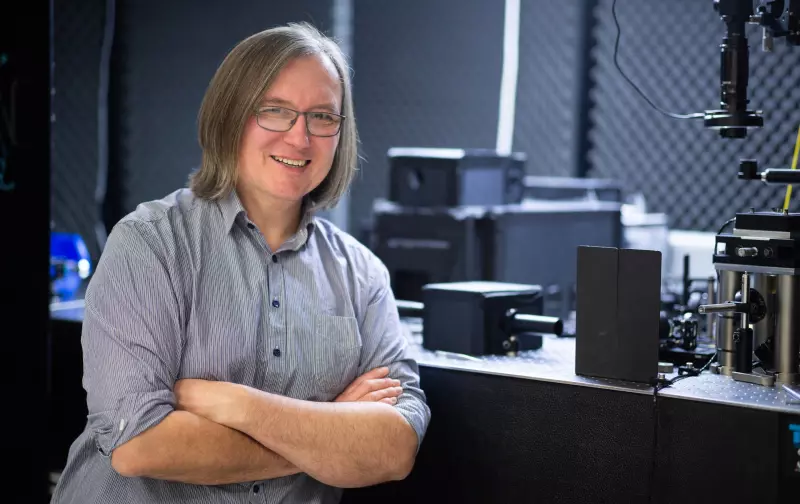Marek Piliarik Group
Institute of Photonics and Electronics, CAS
TPC group associated to DIGS-ILS

Nano Optics group focuses on advancing the knowledge of light-matter interactions below the diffraction limit of light and development of novel optical imaging techniques to understand the function of biological systems at the nanoscale. Our investigative toolbox is mainly comprised of ultrasensitive microscopy combined with high-speed imaging, quantitative phase imaging and nanoscopic 3D reconstruction, super-resolution approaches, fluorescence and Raman scattering spectroscopy and single-photon techniques. This toolbox allows us to explore interactions and dynamics at the level of single proteins and offers unique perspectives of challenging biological questions.
By pushing the spatiotemporal resolution of our experiments to a nanometer and microsecond regime we are gaining access to the nano‑mechanics of single-protein behavior, minimizing the diffusion blur and revealing energetic landscapes and forces attributed to single-protein interactions. This intriguing concept brings us to the understanding of complex biological processes such as the dynamical instability of microtubules and the function of microtubule-associated proteins. Specifically, in our ongoing project we are able to capture the choreography, rate, amplitude and spatiotemporal displacement of transient structural changes at the tip of disassembling microtubules and describe mechanisms enabling the switch from microtubule disassembly into microtubule assembly, termed rescue.

Future projects
Live observation of the dynamical behavior of individual proteins in their natural environment is perhaps the most effective tool for understanding the function of biological matter. Our aim is direct observation and tracking of the protein dynamics without the use of any labels. This opens a whole new field of applications similar to super-resolution microscopy not relying on a fluorescent probe to light up but simply resolve a particular conformation of natural protein structures. Our dedication is in breaking the fundamental limits of conventional microscopy, seeing deeply below the diffraction limit of light as well as well as beyond the noise limits dictated by the photon statics of light.
Institute of Photonics and Electronics
Czech Academy of Sciences
Chaberská 1014/57
182 51 Praha 8
Czech Republic
Marek Piliarik
Phone: +420 266 773 417
E-mail: piliarik@ufe.cz
Since 2016
Team leader Institute of Photonics and Electronics ASCR
2011 – 2016
Postdoctoral Fellow, Max Planck Institute for the Science of Light and Friedrich Alexander University Erlangen-Nuremberg, Erlangen, Germany
2011
Postdoctoral Fellow, Swiss Federal Institute of Technology (ETH) in Zürich, Switzerland
2008 – 2011
Postdoctoral Fellow, Institute of Photonics and Electronics ASCR
2008
PhD in Quantum Optics and Optoelectronics, Faculty of Mathematics and Physics, Charles University, Prague
H.M.L. Robert, Ł. Bujak, K. Holanová, M. Vala, M. Piliarik
Fast photothermal spatial light modulation for quantitative phase imaging at the nanoscale
Nature Communications 12 (2021) 2921
Ł. Bujak, K. Holanová, A.G. Marin, V. Henrichs, I. Barvík, M. Braun, Z. Lánský, M. Piliarik
Fast leaps between millisecond confinements govern Ase1 diffusion along microtubules
Small Methods 5 (2021) 2100370
M. Vala, L. Bujak, A.G. Marin, K. Holanová, V. Henrichs, M. Braun, Z. Lánský, M. Piliarik
Nanoscopic Structural Fluctuations of Disassembling Microtubules Revealed by Label-Free Super-Resolution Microscopy
Small Methods 5 (2021) 2000985
M.P. McDonald, A. Gemeinhardt, K. König, M. Piliarik, S. Schaffer, S. Völkl, M. Aigner, A. Mackensen, V. Sandoghdar
Visualizing Single-Cell Secretion Dynamics with Single-Protein Sensitivity Nano Letters 18 (2018) 513 M. Piliarik, V. Sandoghdar Direct optical sensing of single unlabeled proteins and super-resolution imaging of their binding sites
Nature Communications 5 (2014) 4495